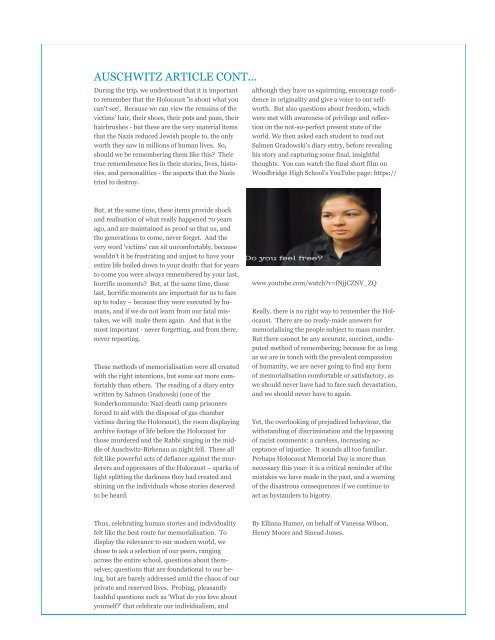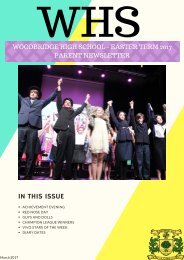February Half Term Parent Newsletter
Create successful ePaper yourself
Turn your PDF publications into a flip-book with our unique Google optimized e-Paper software.
AUSCHWITZ ARTICLE CONT...<br />
During the trip, we understood that it is important<br />
to remember that the Holocaust 'is about what you<br />
can't see'. Because we can view the remains of the<br />
victims' hair, their shoes, their pots and pans, their<br />
hairbrushes - but these are the very material items<br />
that the Nazis reduced Jewish people to, the only<br />
worth they saw in millions of human lives. So,<br />
should we be remembering them like this? Their<br />
true remembrance lies in their stories, lives, histories,<br />
and personalities - the aspects that the Nazis<br />
tried to destroy.<br />
although they have us squirming, encourage confidence<br />
in originality and give a voice to our selfworth.<br />
But also questions about freedom, which<br />
were met with awareness of privilege and reflection<br />
on the not-so-perfect present state of the<br />
world. We then asked each student to read out<br />
Salmen Gradowski’s diary entry, before revealing<br />
his story and capturing some final, insightful<br />
thoughts. You can watch the final short film on<br />
Woodbridge High School’s YouTube page: https://<br />
But, at the same time, these items provide shock<br />
and realisation of what really happened 70 years<br />
ago, and are maintained as proof so that us, and<br />
the generations to come, never forget. And the<br />
very word 'victims' can sit uncomfortably, because<br />
wouldn't it be frustrating and unjust to have your<br />
entire life boiled down to your death: that for years<br />
to come you were always remembered by your last,<br />
horrific moments? But, at the same time, those<br />
last, horrific moments are important for us to face<br />
up to today – because they were executed by humans,<br />
and if we do not learn from our fatal mistakes,<br />
we will make them again. And that is the<br />
most important - never forgetting, and from there,<br />
never repeating.<br />
These methods of memorialisation were all created<br />
with the right intentions, but some sat more comfortably<br />
than others. The reading of a diary entry<br />
written by Salmen Gradowski (one of the<br />
Sonderkommando: Nazi death camp prisoners<br />
forced to aid with the disposal of gas chamber<br />
victims during the Holocaust), the room displaying<br />
archive footage of life before the Holocaust for<br />
those murdered and the Rabbi singing in the middle<br />
of Auschwitz-Birkenau as night fell. These all<br />
felt like powerful acts of defiance against the murderers<br />
and oppressors of the Holocaust – sparks of<br />
light splitting the darkness they had created and<br />
shining on the individuals whose stories deserved<br />
to be heard.<br />
www.youtube.com/watch?v=fNjjCZNV_ZQ<br />
Really, there is no right way to remember the Holocaust.<br />
There are no ready-made answers for<br />
memorialising the people subject to mass murder.<br />
But there cannot be any accurate, succinct, undisputed<br />
method of remembering; because for as long<br />
as we are in touch with the prevalent compassion<br />
of humanity, we are never going to find any form<br />
of memorialisation comfortable or satisfactory, as<br />
we should never have had to face such devastation,<br />
and we should never have to again.<br />
Yet, the overlooking of prejudiced behaviour, the<br />
withstanding of discrimination and the bypassing<br />
of racist comments: a careless, increasing acceptance<br />
of injustice. It sounds all too familiar.<br />
Perhaps Holocaust Memorial Day is more than<br />
necessary this year: it is a critical reminder of the<br />
mistakes we have made in the past, and a warning<br />
of the disastrous consequences if we continue to<br />
act as bystanders to bigotry.<br />
Thus, celebrating human stories and individuality<br />
felt like the best route for memorialisation. To<br />
display the relevance to our modern world, we<br />
chose to ask a selection of our peers, ranging<br />
across the entire school, questions about themselves;<br />
questions that are foundational to our being,<br />
but are barely addressed amid the chaos of our<br />
private and reserved lives. Probing, pleasantly<br />
bashful questions such as ‘What do you love about<br />
yourself?’ that celebrate our individualism, and<br />
By Elliana Hamer, on behalf of Vanessa Wilson,<br />
Henry Moore and Sinead Jones.




